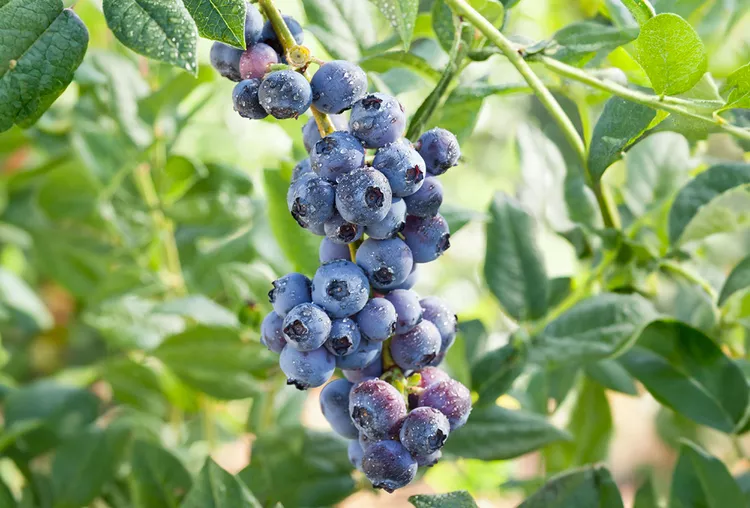How and When to Fertilize Blueberries to Boost Your Harvest

For a bumper crop of luscious fruit and healthy plants, you need to know when to fertilize blueberries as well as the best ways to provide your plants plenty of nutrients. Yep, you have to feed them, and do so at the optimal times to encourage fruit production. This guide explains everything you need to know about fertilizing blueberry plants so you can harvest buckets of delicious berries.
Start with a Soil Test
Before you add fertilizer to blueberries or throw down any amendments in your garden, test the soil. You need to know the condition of the soil to grow any plants successfully. Garden soil can accumulate salts from overuse of fertilizers over time or become depleted of vital nutrients. A soil test tells you exactly which nutrients and other amendments you need to add to the soil. Plus you'll be able to tell whether the pH needs to be adjusted for acid-loving blueberry plants.
You can get DIY soil testing kits online or have your soil tested by your local cooperative extension office. Blueberries grow best in well-drained, acidic soil with a pH of 4.3 to 5.3 and fortified with organic matter. Once you know your soil pH, you can adjust it as needed.
Best Fertilizer for Blueberries
Most fruit crops need annual applications of nitrogen fertilizer to support the growth of roots, leaves, and fruit. The best fertilizer for blueberries gets its nitrogen from ammonium and not nitrate. Blueberries are sensitive to nitrate, and their roots can be damaged by it. Use a fertilizer that gets its nitrogen from urea, sulfur-coated urea, ammonium sulfate, or cottonseed meal.
Try a 7-7-7 or 4-3-4 fertilizer formulated for acid-loving plants. Any fertilizer sold for azaleas or rhododendrons will work well for blueberries. Cottonseed meal is also a good fertilizer for blueberry plants.
Fertilizer alone won’t give you a bumper crop of blueberries, though. You need to feed the soil, too. Add organic material, such as aged manure or compost, to your garden soil to give blueberry plants the nutrients they need to thrive. Rely on the soil test to tell you what amendments to add to your soil to keep blueberries happy and healthy.
When to Fertilize Blueberries
Time the feeding of blueberry plants around their cycle of plant and berry growth and feed your blueberry plant three times a year:
- Early Spring: Apply fertilizer as new plant growth begins and before the buds open. This is usually March or April but varies according to your growing zone.
- Late Spring/Early Summer: Apply a second round of fertilizer six weeks later to support the growing berries and leaves.
- After Harvest: Apply a third dose of fertilizer after you pick the berries in June or July to restore strength to the blueberry plant. That plant put its all into producing a berry crop and needs a nutritional boost.
How Much Fertilizer to Give Blueberries
Too much nitrogen fertilizer can cause a blueberry plant to grow lots of branches at the expense of berry production. The amount of fertilizer you apply depends on the maturity of the blueberry plant. The older the plant is, the more fertilizer you need to apply each year to support fruit growth.
- For first- and second-year blueberry plants, apply half the fertilizer recommended on the label for mature plants.
- For third-year blueberry plants, apply ¾ the amount of fertilizer recommended on the label for mature plants.
- For four-year and older blueberry plants, apply the full amount of fertilizer recommended on the label. At four years, a blueberry plant is mature and can handle a full dose of fertilizer.
How to Fertilize Blueberries
Blueberry plants take up nutrients through their root system, so apply fertilizer to the soil at the base of the plant as a top dressing. Don’t rake or cultivate the soil around the base of the blueberry plant to work in granulated fertilizer; just water it in. Blueberry plants have shallow root systems that can be damaged if you dig in the soil.
Mulch Your Blueberry Plants
Blueberry plants grow faster and produce more berries if you put a 2- to 3-inch-deep layer of organic mulch around the base of the plants. A layer of pine bark, pine straw, compost, or wood chips helps blueberry plants retain moisture and suppress weeds that take nutrients away from the blueberries. The mulch also feeds the soil by adding organic matter as it breaks down. You’ll see steady growth and consistently high yields of blueberries if you mulch the plants.
Don’t use mulch with a high pH, like mushroom compost. Pine bark or pine straw is the best choice because it is acidic and lowers the soil’s pH as it decomposes. Blueberries prefer acidic soil.